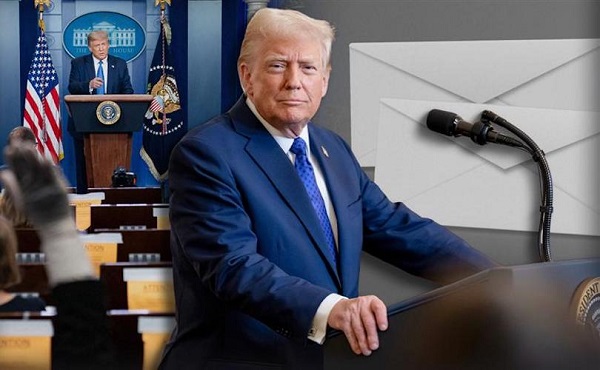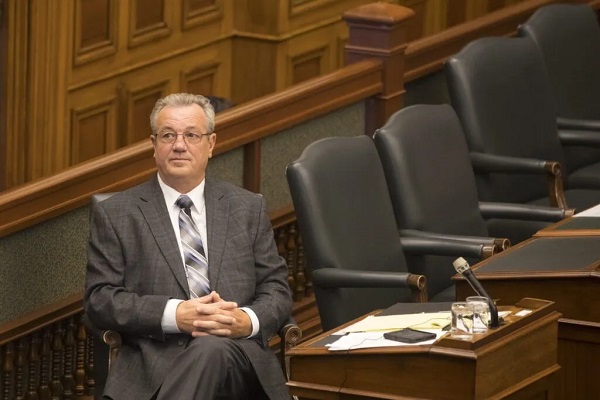International
Prime Minister Trudeau heads to NATO summit, where leaders face critical decisions
Prime Minister Justin Trudeau departs Ottawa on Sunday, June 25, 2023, en route to Iceland. Trudeau is heading to the NATO leaders’ summit in Lithuania this week, where Canada is likely to play a larger-than-usual role in two critical discussions: the alliance’s expanding membership and its efforts to refocus on collective defence. THE CANADIAN PRESS/Sean Kilpatrick
By Sarah Ritchie in Ottawa
Prime Minister Justin Trudeau is heading to the NATO leaders’ summit in Lithuania this week, where Canada is likely to play a larger-than-usual role in two critical discussions: the alliance’s expanding membership and its efforts to refocus on collective defence.
Trudeau is expected to depart for Riga, Latvia, from Ottawa on Sunday evening. He is due to meet with that country’s leaders on Monday before heading to the Lithuanian capital for the first day of the NATO summit on Tuesday.
At last year’s summit in Madrid, NATO leaders identified Russia as “the most significant and direct threat to allies’ security and to peace and stability in the Euro-Atlantic area” in a strategic concept document that set out their intent to strengthen deterrence and defence in the region.
That came after a meeting in Brussels in March 2022, when leaders agreed to deploy four new multinational battle groups on the eastern flank in Bulgaria, Hungary, Romania and Slovakia, adding to those in Estonia, Latvia, Lithuania and Poland.
The alliance has drafted a new defence plan that leaders will be asked to approve in Vilnius, one that is being described as a return to its Cold War stance.
“What we’re seeing now is really a return to NATO’s core business,” said Tim Sayle, a NATO historian and professor at the University of Toronto.
He said this likely also means a return to more challenging negotiations among members as they decide on defence policy and procurement, at the same time as they are debating whether to allow Sweden and Ukraine to join. And on both topics, he said, allies will be looking to Canada.
“Rarely are there summits where Canada would be a focus of any elements, but I do think (it) is here,” Sayle said.
“Canada has a decision to make about its role in the discussion about Ukraine, but it also has this decision to make about Canadian defence spending and just what kind of ally Canada is going to be.”
Adm. Rob Bauer, the chair of NATO’s military committee, told media at a July 3 briefing that the new defence plan is split into three parts: the southeast region including the Mediterranean and the Black Sea, the central region from the Baltics to the Alps and the High North and Atlantic region.
Once the plans are approved, the real work begins. “Then we have to go and do our work to reach the higher number of forces with a higher readiness, we need to exercise against the plans, we need to buy the capabilities that we require,” Bauer said.
That will require more money. Only about a third of NATO members are meeting the agreed-upon target of spending two per cent of their GDP on defence — which includes a pledge to dedicate one-fifth of that funding to equipment.
Bauer said he expects two per cent will be the spending floor, instead of the target, by the time the summit is over.
“There is perhaps a stronger link than ever before between the new defence plans, the new defence investment pledge and the NATO defence planning process,” NATO spokesperson Oana Lungescu said at the July 3 briefing.
For the countries that are lagging behind, there will be increasing pressure to step up.
Canada spends about 1.3 per cent of its GDP on defence and has no public plan to get to the current target. Defence Minister Anita Anand has insisted that Canada’s contributions to the defence of Ukraine and its leadership in heading up a NATO battle group in Latvia are more important.
Before attending the NATO summit, Trudeau is set to participate in meetings Monday with Latvia’s president, Edgars Rinkēvičs, and its prime minister, Krišjānis Kariņš.
Trudeau is also expected to meet Canadian Armed Forces members who are part of the country’s largest overseas mission.
But even in Latvia, Canada seems to be lagging behind. It’s been more than a year since Anand pledged to expand the battle group to a combat-ready brigade, and detailed plans are still being negotiated. Battle groups typically have close to 1,000 troops, while military members in a brigade number about 3,000.
Canada has committed to sending a tank squadron with 15 Leopard 2 tanks and some 130 personnel to Latvia starting this fall, but it is unclear how many more troops will join the 800 Canadians already in place.
Other countries have gone further. Germany has pledged to station a 4,000-soldier brigade in Lithuania. The United Kingdom, which is leading a battle group in Estonia, and the United States, which leads another in Poland, tested their ability to quickly scale up to a brigade earlier this spring.
Leaders in Vilnius are also likely to focus on the status of Sweden and Ukraine, each of which has asked to join NATO.
Last-minute talks aimed at getting Turkiye and Hungary on side with allowing Sweden to become a member have not been successful. Its Nordic neighbour Finland joined most recently, in April.
If Sweden’s membership is approved, Bauer said it won’t take long to adapt the defence plans.
“Sweden is at the table in the military committee, in the North Atlantic Council every week. So they know basically everything already,” he said.
More contentious than that is the issue of when to admit Ukraine.
Some nations are pushing for immediate membership. U.K. Defence Secretary Ben Wallace said last month that he hopes to see an expedited process.
Meanwhile, Trudeau has repeatedly stated that Canada supports Ukraine’s membership “when the conditions are right,” without defining what those conditions are.
Sayle said it’s likely that other countries will expect a clearer response this time given the magnitude of the decision: whether to admit a nation that is in the midst of an active invasion to an alliance focused on collective defence.
“I think that what NATO says about Ukrainian membership will impact both the Ukrainian and Russian strategic calculations in this war, and any peace that might follow,” Sayle said.
This report by The Canadian Press was first published July 9, 2023.
Daily Caller
AI Needs Natural Gas To Survive


From the Daily Caller News Foundation
By David Blackmon
As recent studies project a big rise in power generation demand from the big datacenters that are proliferating around the United States, the big question continues to focus in on what forms of generation will rise to meet the new demand. Most datacenters have plans to initially interconnect into local power grids, but the sheer magnitude of their energy needs threatens to outstrip the ability of grid managers to expand supply fast enough.
This hunger for more affordable, 24/7 baseload capacity is leading to a variety of proposed solutions, including President Donald Trump’s new executive orders focused on reviving the nation’s coal industry, scheduled to be signed Tuesday afternoon. But efforts to restart the permitting of new coal-fired power plants in the US will require additional policy changes, efforts which will take time and could ultimately fail. In the meantime, datacenter developers find themselves having to delay construction and completion dates until firm power supply can be secured.
Datacenters specific to AI technology require ever-increasing power loads. For instance, a single AI query can consume nearly ten times the power of a traditional internet search, and projections suggest that U.S. data center electricity consumption could double or even triple by 2030, rising from about 4-5% of total U.S. electricity today to as much as 9-12%. Globally, data centers could see usage climb from around 536 terawatt-hours (TWh) in 2025 to over 1,000 TWh by 2030. In January, a report from the American Security Project estimated that datacenters could consume about 12% of all U.S. power supply.
Obviously, the situation calls for innovative solutions. A pair of big players in the natural gas industry, Liberty Energy and Range Resources, announced on April 8 plans to diversify into the power generation business with the development of a major new natural gas power plant to be located in the Pittsburgh area. Partnering with Imperial Land Corporation (ILC), Liberty and Range will locate the major power generation plant in the Fort Cherry Development District, a Class A industrial park being developed by ILC.
“The strategic collaboration between Liberty, ILC, and Range will focus on a dedicated power generation facility tailored to meet the energy demands of data centers, industrial facilities, and other high-energy-use businesses in Pennsylvania,” the companies said in a joint release.
Plans for this new natural gas power project follows closely on the heels of the March 22 announcement for plans to transform the largest coal-fired power plant in Pennsylvania, the Homer City generating station, into a new gas-fired facility. The planned revitalized plant would house 7 natural gas turbines with a combined capacity of 4.5 GW, enough power 3 million homes.
Both the Homer City station and the Fort Cherry plant will use gas produced out of the Appalachia region’s massive Marcellus Shale formation, the most prolific gas basin in North America. But plans like these by gas companies to invest in their own products for power needs aren’t isolated to Pennsylvania.
In late January, big Permian Basin oil and gas producer Diamondback Energy told investors that it is seeking equity partners to develop a major gas-fired plan on its own acreage in the region. The facility would primarily supply electricity to data centers, which are expected to proliferate in Texas due to the AI boom, while also providing power for Diamondback’s own field operations. This dual-purpose approach could lower the company’s power costs and create a new revenue stream by selling excess electricity.
Prospects for expansion of gas generation in the U.S. received a big boost in January when GE Vernova announced plans for a $600 million expansion of its manufacturing capacity for gas turbines and other products in the U.S. GE Vernova is the main supplier of turbines for U.S. power generation needs. The company plans to build 37 gas power turbines in 2025, with a potential increase to over 70 by 2027, to meet rising energy demands.
The bottom line on these and other recent events is this: Natural gas is quickly becoming the power generation fuel of choice to feed the needs of the expanding datacenter industry through 2035, and potentially beyond. Given that reality, the smart thing to do for these and other companies in the natural gas business is to put down big bets on themselves.
David Blackmon is an energy writer and consultant based in Texas. He spent 40 years in the oil and gas business, where he specialized in public policy and communications.
International
Trump White House will ignore reporter emails that include ‘preferred pronouns’ in signature

From LifeSiteNews
“Any reporter who chooses to put their preferred pronouns in their bio clearly does not care about biological reality or truth and therefore cannot be trusted to write an honest story”
The White House will ignore all emails from reporters which include preferred gender pronouns in their email signatures according to Press Secretary Karoline Leavitt.
“Any reporter who chooses to put their preferred pronouns in their bio clearly does not care about biological reality or truth and therefore cannot be trusted to write an honest story,” Leavitt wrote in response to a request for comment from the New York Times.
The practice of citing one’s preferred gender pronouns, which is increasingly prevalent among leftists, stems from gender ideology, the idea that people have a “gender identity” that is distinct from their sex. Thus, for example, women who identify as males may include the gender pronouns “he/him” in their email signature or other identifiers.
Leavitt had previously stated to a NYT reporter who inquired about the potential closure of a climate research observatory, “As a matter of policy, we do not respond to reporters with pronouns in their bios.”
The New York Times reported that Katie Miller, senior advisor for the Department Of Government Efficiency (DOGE), had weeks prior declined another question from a Times reporter, for the same reason.
“As a matter of policy, I don’t respond to people who use pronouns in their signatures as it shows they ignore scientific realities and therefore ignore facts,” Miller said in an email. In a separate message, she noted, “This applies to all reporters who have pronouns in their signature.”
-

 Also Interesting2 days ago
Also Interesting2 days agoMortgage Mayhem: How Rising Interest Rates Are Squeezing Alberta Homeowners
-

 Justice2 days ago
Justice2 days agoCanadian government sued for forcing women to share spaces with ‘transgender’ male prisoners
-

 Alberta2 days ago
Alberta2 days agoAlberta takes big step towards shorter wait times and higher quality health care
-

 Business2 days ago
Business2 days agoStocks soar after Trump suspends tariffs
-

 COVID-191 day ago
COVID-191 day agoBiden Admin concealed report on earliest COVID cases from 2019
-

 MAiD2 days ago
MAiD2 days agoDisability rights panel calls out Canada, US states pushing euthanasia on sick patients
-

 COVID-192 days ago
COVID-192 days agoRandy Hillier wins appeal in Charter challenge to Covid lockdowns
-

 Business2 days ago
Business2 days agoTrump raises China tariffs to 125%, announces 90-day pause for countries who’ve reached out to negotiate




